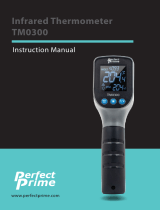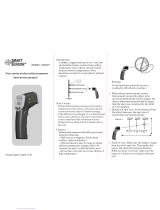
42515-EU V4.1 2/09
5
The MODE button options
The MODE button is used to access the programming functions of the instrument. The
selected function is displayed on the bottom line of the LCD. Each parameter is listed
below with a detailed account of its use. Press the MODE button to step from one
parameter to the next.
EMS (Emissivity Value)
To change the emissivity value, use the UP and DOWN arrows (the range is 0.10 to
1.00). The current emissivity setting is always shown at the top of the LCD display. A
setting of 0.95 covers about 90% of all applications. Emissivity is discussed in a
dedicated section of this manual.
MAX (Maximum function)
In the MAX mode, only the highest reading encountered in the current measurement
session is displayed
MIN (Minimum function)
In the MIN mode, only the lowest reading is displayed
DIF (Max minus Min value)
In the DIF mode, the MAX less the MIN is displayed.
AVG (Average value)
In the AVG mode, all of the readings in the current measurement session are
averaged and the value is displayed.
HAL (High Alarm setting)
The temperature that, when exceeded, causes the audible/visual alarm to trip.
LAL (Low Alarm setting)
The temperature that, when exceeded high to low, causes the audible/visual alarm to
trip.
T k (Type-K contact thermocouple sensor function)
The temperature reading of the Type-K contact probe is shown next to the ‘T k’ icon display.
If the sensor is not correctly inserted to the meter the display will show all dashes ‘-----‘.
Automatic Emissivity Adjustment
The 42515 has the ability to automatically calibrate the emissivity setting. However, in
order to do so, the temperature of the measured surface must be above 100ºC (212ºF).
Follow the steps below to use the automatic emissivity adjustment feature:
1. Press the MODE button until the EMS (Emissivity) icon appears on the lower LCD line.
2. Press and hold the Laser/Backlight button until the EMS icon begins to blink and the
emissivity value is displayed as “___”.
3. The IR temperature will be displayed on the middle line of the LCD and the Type-K
temperature will be displayed on the lower LCD line.
4. Touch the Type-K sensor to the surface and, at the same time, take an IR reading.
5. When both the IR and the Type-K measurements stabilize, press the UP or DOWN
arrow button. The new emissivity value will now be displayed.
6. Proceed to take measurements.











